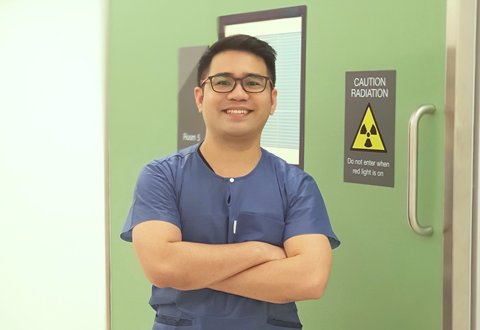
When Senior Staff Nurse (SSN) Arnold Jandugan Colot (pictured above) first joined NHCS more than a decade ago, he was so shy that he kept to himself most of the time, quietly doing his own work and avoided talking to the patients as much as possible.
Chance encounters with patients whom had no visitors, changed him, “I noticed that some patients never had visitors when they were warded – the feeling of being alone resonated with me especially since I’m living alone here in Singapore.” SSN Arnold began to open up and interact more with patients.
In the course of his work to provide patient care, he knows that it is vital to communicate and connect well with patients, hence he challenged himself to improve his communication skills and to be able to speak confidently. Over time with his determination, he has established bonds with many of his patients, and is no longer a shy person like before.
This transformation in him not only has helped him in obtaining his first NHCS Service Quality (SQ) Award (barely a few months after he joined in 2008), but also a total of seven service awards till date. He has received several recognition awards including the Singapore Health Quality Service Awards (SHQSA) as well as the sole NHCS SQ Gold Award for 2018/2019!

SSN Arnold’s confidence and eloquence bagged him the Best Speech Award at the 4th Nursing Research Day (pictured here receiving the award from Dr Calvin Chin, Senior Consultant, Department of Cardiology, who was one of the judges for the Best Speech Contest).
Having been in NHCS for over 11 years, SSN Arnold has rotated to several departments from Ward 56 to the Short Stay Unit (SSU) and now, he has started a new chapter at the Cardiac Cathetherisation Laboratory (Cath Lab). What has been his motivating factors to always give his best for patients all these years? Let’s hear from him.
No service mantra, but a constant reminder
I always see my patients as a part of my family regardless of their race, religion, age or sex. Once you start treating them like your family, you would start to think in their shoes and genuinely care for them. I don't have a service mantra but I will always remind myself every day that patients are here because they are sick and they need my help. I also believe communication is the key to providing the best patient care.
Different challenges, different growth
Each journey in NHCS has exposed me to different experiences and taught me different things. My days at Ward 56 and SSU were largely bedside care. From there, I learned how to communicate effectively with patients and their next-of-kins, and to be more confident and assertive in dealing with patients.
Now, I’m ready to start a whole new journey at the Cath Lab. The work is more challenging because I get to be involved in procedures such as coronary angiogram/angioplasty and electrophysiology. All these require me to be alert and observant at all times – you will not know when a patient may encounter life-threatening situations so you really need to react quickly.
Tips and tricks to patient care
I couldn’t emphasise even more that communication is key to quality care. Hence I always make it a point to ask my patients regularly how they feel, and to address their needs and concern. It can be as simple as asking if they want to pass urine (instead of waiting for them to press the call bell) or if they are in pain. Before each doctor’s round, I will remind my patients to think of the questions they wish to ask the doctor, and before their discharge, I will ensure that the patients have their appointments scheduled and sufficient medication to last till the next appointment.
Such gestures may seem simple but they actually made the patients feel happy, secure and grateful. Seeing them happy makes me happy too! It’s extremely satisfying to see them going home with a smile on their faces, and gratifying when some came forward to shake my hands or give a pat on my back. Remember, treat others the way you would want to be treated, and I truly believe patients can sense our genuine care towards them.













 Get it on Google Play
Get it on Google Play